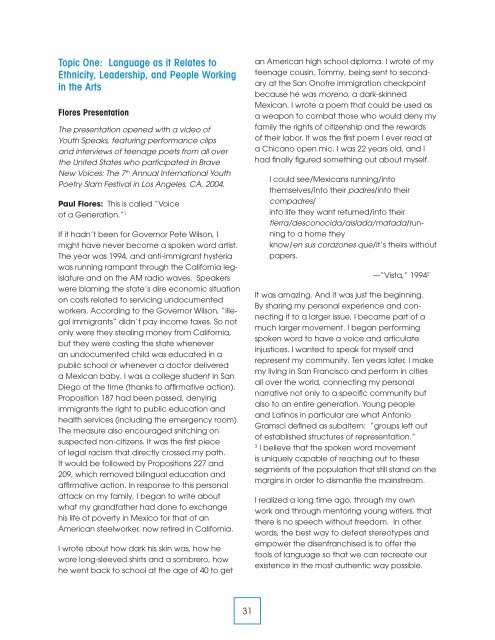The New Face of Arts Leadership in the West - westaf - The Western ...
The New Face of Arts Leadership in the West - westaf - The Western ...
The New Face of Arts Leadership in the West - westaf - The Western ...
Create successful ePaper yourself
Turn your PDF publications into a flip-book with our unique Google optimized e-Paper software.
Topic One: Language as it Relates to<br />
Ethnicity, <strong>Leadership</strong>, and People Work<strong>in</strong>g<br />
<strong>in</strong> <strong>the</strong> <strong>Arts</strong><br />
Flores Presentation<br />
<strong>The</strong> presentation opened with a video <strong>of</strong><br />
Youth Speaks, featur<strong>in</strong>g performance clips<br />
and <strong>in</strong>terviews <strong>of</strong> teenage poets from all over<br />
<strong>the</strong> United States who participated <strong>in</strong> Brave<br />
<strong>New</strong> Voices: <strong>The</strong> 7 th Annual International Youth<br />
Poetry Slam Festival <strong>in</strong> Los Angeles, CA, 2004.<br />
Paul Flores: This is called “Voice<br />
<strong>of</strong> a Generation.” 1<br />
If it hadn’t been for Governor Pete Wilson, I<br />
might have never become a spoken word artist.<br />
<strong>The</strong> year was 1994, and anti-immigrant hysteria<br />
was runn<strong>in</strong>g rampant through <strong>the</strong> California legislature<br />
and on <strong>the</strong> AM radio waves. Speakers<br />
were blam<strong>in</strong>g <strong>the</strong> state’s dire economic situation<br />
on costs related to servic<strong>in</strong>g undocumented<br />
workers. Accord<strong>in</strong>g to <strong>the</strong> Governor Wilson, “illegal<br />
immigrants” didn’t pay <strong>in</strong>come taxes. So not<br />
only were <strong>the</strong>y steal<strong>in</strong>g money from California,<br />
but <strong>the</strong>y were cost<strong>in</strong>g <strong>the</strong> state whenever<br />
an undocumented child was educated <strong>in</strong> a<br />
public school or whenever a doctor delivered<br />
a Mexican baby. I was a college student <strong>in</strong> San<br />
Diego at <strong>the</strong> time (thanks to affirmative action).<br />
Proposition 187 had been passed, deny<strong>in</strong>g<br />
immigrants <strong>the</strong> right to public education and<br />
health services (<strong>in</strong>clud<strong>in</strong>g <strong>the</strong> emergency room).<br />
<strong>The</strong> measure also encouraged snitch<strong>in</strong>g on<br />
suspected non-citizens. It was <strong>the</strong> first piece<br />
<strong>of</strong> legal racism that directly crossed my path.<br />
It would be followed by Propositions 227 and<br />
209, which removed bil<strong>in</strong>gual education and<br />
affirmative action. In response to this personal<br />
attack on my family, I began to write about<br />
what my grandfa<strong>the</strong>r had done to exchange<br />
his life <strong>of</strong> poverty <strong>in</strong> Mexico for that <strong>of</strong> an<br />
American steelworker, now retired <strong>in</strong> California.<br />
I wrote about how dark his sk<strong>in</strong> was, how he<br />
wore long-sleeved shirts and a sombrero, how<br />
he went back to school at <strong>the</strong> age <strong>of</strong> 40 to get<br />
an American high school diploma. I wrote <strong>of</strong> my<br />
teenage cous<strong>in</strong>, Tommy, be<strong>in</strong>g sent to secondary<br />
at <strong>the</strong> San On<strong>of</strong>re immigration checkpo<strong>in</strong>t<br />
because he was moreno, a dark-sk<strong>in</strong>ned<br />
Mexican. I wrote a poem that could be used as<br />
a weapon to combat those who would deny my<br />
family <strong>the</strong> rights <strong>of</strong> citizenship and <strong>the</strong> rewards<br />
<strong>of</strong> <strong>the</strong>ir labor. It was <strong>the</strong> first poem I ever read at<br />
a Chicano open mic. I was 22 years old, and I<br />
had f<strong>in</strong>ally figured someth<strong>in</strong>g out about myself.<br />
I could see/Mexicans runn<strong>in</strong>g/<strong>in</strong>to<br />
<strong>the</strong>mselves/<strong>in</strong>to <strong>the</strong>ir padres/<strong>in</strong>to <strong>the</strong>ir<br />
compadres/<br />
<strong>in</strong>to life <strong>the</strong>y want returned/<strong>in</strong>to <strong>the</strong>ir<br />
tierra/desconocida/aislada/matada/runn<strong>in</strong>g<br />
to a home <strong>the</strong>y<br />
know/en sus corazones que/it’s <strong>the</strong>irs without<br />
papers.<br />
—“Vista,” 1994 2<br />
It was amaz<strong>in</strong>g. And it was just <strong>the</strong> beg<strong>in</strong>n<strong>in</strong>g.<br />
By shar<strong>in</strong>g my personal experience and connect<strong>in</strong>g<br />
it to a larger issue, I became part <strong>of</strong> a<br />
much larger movement. I began perform<strong>in</strong>g<br />
spoken word to have a voice and articulate<br />
<strong>in</strong>justices. I wanted to speak for myself and<br />
represent my community. Ten years later, I make<br />
my liv<strong>in</strong>g <strong>in</strong> San Francisco and perform <strong>in</strong> cities<br />
all over <strong>the</strong> world, connect<strong>in</strong>g my personal<br />
narrative not only to a specific community but<br />
also to an entire generation. Young people<br />
and Lat<strong>in</strong>os <strong>in</strong> particular are what Antonio<br />
Gramsci def<strong>in</strong>ed as subaltern: “groups left out<br />
<strong>of</strong> established structures <strong>of</strong> representation.”<br />
3<br />
I believe that <strong>the</strong> spoken word movement<br />
is uniquely capable <strong>of</strong> reach<strong>in</strong>g out to <strong>the</strong>se<br />
segments <strong>of</strong> <strong>the</strong> population that still stand on <strong>the</strong><br />
marg<strong>in</strong>s <strong>in</strong> order to dismantle <strong>the</strong> ma<strong>in</strong>stream.<br />
I realized a long time ago, through my own<br />
work and through mentor<strong>in</strong>g young writers, that<br />
<strong>the</strong>re is no speech without freedom. In o<strong>the</strong>r<br />
words, <strong>the</strong> best way to defeat stereotypes and<br />
empower <strong>the</strong> disenfranchised is to <strong>of</strong>fer <strong>the</strong><br />
tools <strong>of</strong> language so that we can recreate our<br />
existence <strong>in</strong> <strong>the</strong> most au<strong>the</strong>ntic way possible.<br />
31


